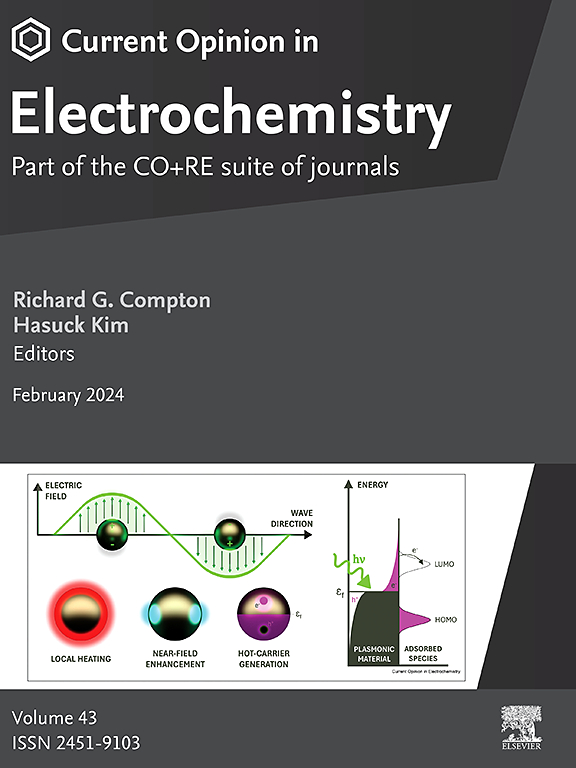Cation effects in electrochemical CO2 reduction
IF 6.9
2区 化学
Q1 CHEMISTRY, PHYSICAL
引用次数: 0
Abstract
Electrochemical CO2 reduction (CO2R) provides a pathway toward the sustainable production of chemicals. Recent catalyst- and system-level innovations have enabled electrosynthesis of multi-carbon products at practical productivities (>200 mA cm−2) and single-pass CO2 conversion efficiencies (>80 %). However, practical CO2R requires high single product selectivity (>85 %) without compromising readily-achieved metrics. Coupling these metrics in a single system warrants clear understanding of the electrical double layer at the catalyst–electrolyte interface. Combining selective catalysts with cation effects can effectively tune CO2R kinetics at the catalyst–electrolyte interface. Here we overview recent progress and current understanding on the sophisticated nature of the cation effects and underscore critical parameters that influence cation distributions in the electrical double layer. We highlight the emerging characterization and computational approaches to elucidate cation effects on CO2R. Finally, we emphasize research directions through which cation effects could be coupled with other micro-reaction environment tuning strategies for further selectivity and efficiency improvements.
电化学CO2还原中的阳离子效应
电化学CO2还原(CO2R)为化学品的可持续生产提供了一条途径。最近的催化剂和系统级创新使多碳产品的电合成具有实际生产力(200毫安厘米−2)和单道二氧化碳转化效率(80%)。然而,实际的CO2R需要高的单一产品选择性(> 85%),而不影响容易实现的指标。将这些指标耦合到一个系统中,可以清楚地了解催化剂-电解质界面上的双电层。选择性催化剂与阳离子效应的结合可以有效地调节催化剂-电解质界面上的CO2R动力学。在这里,我们概述了最近的进展和目前对阳离子效应复杂性质的理解,并强调了影响双电层中阳离子分布的关键参数。我们强调了新兴的表征和计算方法来阐明对CO2R的影响。最后,我们强调了阳离子效应可以与其他微反应环境调节策略耦合以进一步提高选择性和效率的研究方向。
本文章由计算机程序翻译,如有差异,请以英文原文为准。
求助全文
约1分钟内获得全文
求助全文
来源期刊

Current Opinion in Electrochemistry
Chemistry-Analytical Chemistry
CiteScore
14.00
自引率
5.90%
发文量
272
审稿时长
73 days
期刊介绍:
The development of the Current Opinion journals stemmed from the acknowledgment of the growing challenge for specialists to stay abreast of the expanding volume of information within their field. In Current Opinion in Electrochemistry, they help the reader by providing in a systematic manner:
1.The views of experts on current advances in electrochemistry in a clear and readable form.
2.Evaluations of the most interesting papers, annotated by experts, from the great wealth of original publications.
In the realm of electrochemistry, the subject is divided into 12 themed sections, with each section undergoing an annual review cycle:
• Bioelectrochemistry • Electrocatalysis • Electrochemical Materials and Engineering • Energy Storage: Batteries and Supercapacitors • Energy Transformation • Environmental Electrochemistry • Fundamental & Theoretical Electrochemistry • Innovative Methods in Electrochemistry • Organic & Molecular Electrochemistry • Physical & Nano-Electrochemistry • Sensors & Bio-sensors •
 求助内容:
求助内容: 应助结果提醒方式:
应助结果提醒方式:


